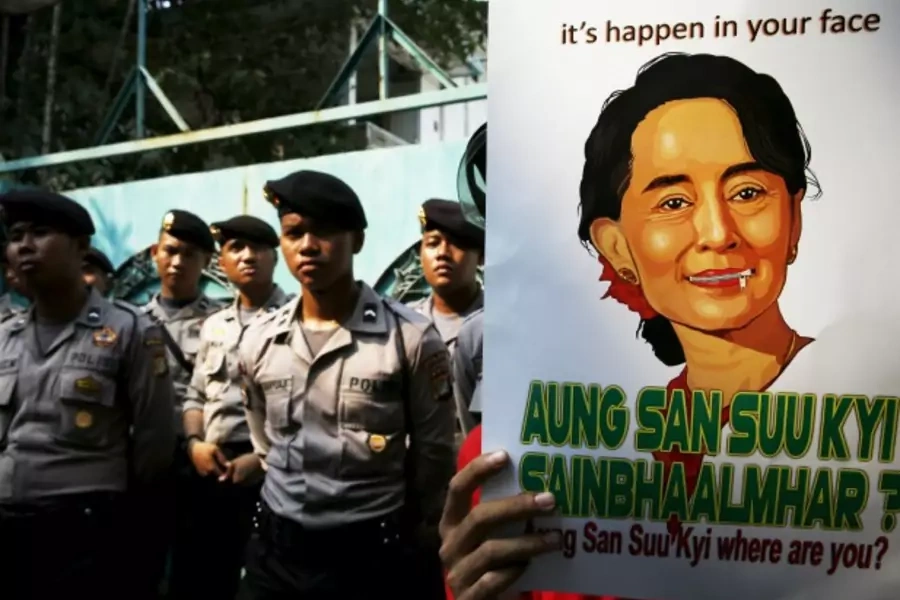More on:
For more than three years, as Rohingya in western Myanmar have faced violent attacks, seizure of their homes, and a growing climate of intolerance in public discourse, leaders across the Myanmar political spectrum have either remained silent or actually encouraged discrimination. The Myanmar government surely deserves much of the blame for this environment. Thein Sein’s government participated in last month’s regional crisis meeting in Bangkok on migration only reluctantly, and only after the scope of the meeting was publicly changed so that it addressed migration generally and not the Rohingya. At the meeting, Myanmar officials told reporters that “finger pointing” would not help resolve the crisis, and denied that Naypyidaw bore any blame for the conditions that led Rohingya to flee.
However, the opposition National League for Democracy (NLD), which is likely to dominate national parliamentary elections in the fall, has hardly been outspoken about the Rohingya. When the violence against Rohingya erupted more than three years ago several NLD members and other prominent democracy activists actually seemed to blame the Rohingya for the attacks. Ko Ko Gyi, a longtime democracy activist and former political prisoner, said in 2012 that “Rohingya [Muslims] are not one of the ethnic groups of Myanmar at all … genetically, culturally, and linguistically [these] Rohingya are not absolutely related to any ethnicity in Myanmar.”
Since then, most of the NLD leadership has avoided any public criticism of the Rohingya, but also has not criticized attacks on the minority group or government policies that encourage anti-Rohingya discrimination. Aung San Suu Kyi has been notably silent on the issue. Other NLD leaders, like party vice chairman Tin Oo, also have had little to say about the Rohingya. The Nobel laureate was pointedly not invited to address a conference on the Rohingya crisis held in Oslo in late May; another Nobel laureate, Archbishop Desmond Tutu, spoke to the conference and expressed despair at the plight of the Rohingya. (Another Nobel Peace laureate, the Dalai Lama, in May told The Australian newspaper, "It’s not sufficient [for Suu Kyi] to say: ’How to help these people?’")
In the middle of May, however, the NLD seems to have shifted, at least a bit, on the Rohingya issue. On the sidelines of a meeting between political parties in Yangon, NLD spokesperson Nyan Win told reporters that the rights of the Rohingya should be protected, and that Naypyidaw should consider granting them Myanmar citizenship. "If they are not accepted (as citizens), they cannot just be sent onto rivers. Can’t be pushed out to sea. They are humans. I just see them as humans who are entitled to human rights," spokesperson Nyan Win told Agence France-Presse. Nyan Win then told The Independent, “The problem needs to be solved by the law. The law needs to be amended. After one or two generations [of residence] they [the Rohingya] should have the right to be citizens.” Nyan Win’s remarks were by far the boldest by the NLD; the government, and many NLD members, insists that the Rohingya are illegal migrants to Myanmar, even though many Rohingya have lived in the country for generations.
Although this statement does not make up for Suu Kyi’s continued silence, and it does not change the situation on the ground in Arakan State, it is a small step forward for the NLD, and one that party members could build upon. To be sure, Nyan Win’s statement does not even have the force of an official change in policy position by the NLD leadership. Yet having spoken with many of the younger generation of NLD members and leaders, I know that there is a group of NLD members who want the party, and Suu Kyi, to speak out more boldly about protecting Rohingya rights. Perhaps NLD members who want to speak out about the Rohingya will do so now, and might even encourage Suu Kyi to take a stronger stance.
More on:
 Online Store
Online Store
